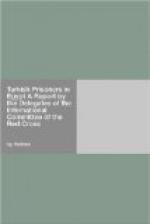Correspondence.—Each person interned has the chance of writing once a week; those who do not know how to write get help from their companions. An interpreter is attached to the camp. Many letters arrive through the medium of the International Red Cross Committee, but the exchange of correspondence is not generally very active.
Wishes of the Interned.—Some of the women express a wish to see their husbands more often, at least once a month; others wish to see their sons or brothers who are prisoners at Maadi or at Sidi Bishr. This being a legitimate and comprehensible desire, the English Government has several times already allowed the husbands to come from these camps (4 hours distant by train) to spend three or four days with their wives in the Citadel. A part of the building containing 12 rooms has been reserved for these visits. But it would clearly be impossible to permit these indulgences often, as they entail considerable expense, and require much organisation and surveillance.
Repatriation.—Some of the women beg to be sent back to Turkey, which the British Government has already offered to do. Many, on the other hand, prefer to remain in Cairo. The American charge d’affaires in Egypt, M. Knabenschuh, is considering this question. He has visited the camp several times, and has transmitted different propositions of the English Government to the Sublime Porte. The first offer was to repatriate the interned women and children by means of an American vessel, which would land them at the port of Mersina in Asia Minor. The second was to take them back to Turkey in an English hospital ship, which should at the same time carry medical supplies, food and clothing to the English prisoners in Asia Minor, and bring away about 25 English ladies who had been made prisoners in Mesopotamia. Finally, the English Government offered to repatriate the Turkish women without any reciprocity conditions. Unhappily, up to now all these proposals have borne no fruit. The English Government sincerely desires to be freed from the maintenance and surveillance of these people, whom it took under its care merely for reasons of humanity.
Special Inquiry at the Citadel Camp.—During our visit to the Maadi Camp, Dr. Suleiman Bey, head physician at Taif, a town of the Hedjaz, told us that he had personally nothing to complain of in the camp treatment, but that his wife and children, interned in the Cairo Citadel, were suffering greatly from the conditions there. What he especially criticised was the diet and the medical attendance. These complaints, made in much detail, seemed to us to deserve a specific inquiry, and we went again to the Citadel next day. We closely cross-questioned Mme. S. and another of the ladies. Her replies, collected and confronted with the official data, our personal observations, and the testimony of the other interned, absolutely convinced us that Dr. Suleiman’s




